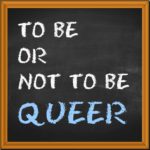Search Result
Labels, acronyms, gender pronouns, and symbols
To be or not to be queer
 The meaning of ‘queer’ has changed a lot over recent decades. From being a slur, to being reclaimed by some LGBT+ people and being rejected by others. The short answer is that ‘queer’ means different things to different people.
The meaning of ‘queer’ has changed a lot over recent decades. From being a slur, to being reclaimed by some LGBT+ people and being rejected by others. The short answer is that ‘queer’ means different things to different people.
Finding umbrella terms for a community as diverse as ours isn’t easy and over the last fifty years or so, we’ve cycled the 'LGB community', the ‘gay community’ the ‘gay and lesbian community’, and the ‘LGBT community ... and so on ... including those who don't believe we should have labels like this at all, or be lumped together in this way.
Like the word "gay" used to mean “happy”, queer used to mean “strange” or “different”. But like all words, its use evolved over time and quickly came to mean something different.
There’re lots of reasons why people identify with 'queer', either individually or as an umbrella term. It encompasses a wide range of identities, and doesn’t risk excluding groups that the acronym may leave out. Some people find queer’s ambiguity appealing since it gives a sense of community without the need for a more specific label. You might be gay, I might be trans - but we’re both queer, and that brings us together.
For some, using 'queer' also aims to be an all-inclusive, a unifying umbrella term that includes people who are same gender attracted and gender diverse as well as the intersections of people and identities within our community. Also, people like it because it’s easy to say, and a whole lot fewer syllables than LGBTIQ and overall, it’s easier to use and remember; especially if this all new to you.
There are people who dislike the term, mostly due of the fact that it has also been a term that’s used as a slur (a word people use with hate). In the 1960s onwards, people used the word queer as a weapon, usually saying it when attacking or trying to humiliate LGBTIQ people. It wasn’t until the 1980s when activists began to reclaim it, writing it on banners and flags when marching and protesting.
Reclaiming language is a powerful tool against other people’s hate and bullying. The thinking behind it is that you can’t be hurt by words that you use to describe yourself. Take the word ‘slut’ for example. If someone calls you a slut it takes away a lot of that person’s power if you turn around and say “I am, so what?”
For some, words do hurt, and for anyone who’s been called queer as an insult, hearing it used within your community can remind you of those experiences. This doesn't mean that it's never OK to use the phrase 'the queer community'. It’s important to keep in mind that there is no umbrella term that everyone is 100% happy with. Lots of people don’t like LGBTIQ! So there’s no one size fits all.
So while it’s a word we use, keep in mind that not everybody uses it, and that’s totally OK if they don’t.
BTW: MEN R US has adapted these words from an original piece by MINUS18 Australia titled "What Does Queer Mean Anyway? with their kind permission.
What Does Queer Mean Anyway? | MINUS18 | 18 Oct 2017
Queer | Wikipedia
Reclaiming 'queer' | Lacuna Voices
How the word ‘queer’ was adopted by the LGBTQ community | Columbia Journalism Review | 22 Jan 2019
Queer politics has been a force for change; celebrate how far we've come | The Guardian | 27 Jul 2017
Tracing the history of the word ‘queer’ | Dazed | 28 Jul 2016
Queering the map
Queering the Map is a community-generated mapping project that geo-locates queer moments, memories and histories in relation to physical space. As queer life becomes increasingly less centered around specific neighborhoods and the buildings within them, notions of ‘queer spaces’ become more abstract and less tied to concrete geographical locations. The intent of the Queering the Map project is to collectively document the spaces that hold queer memory, from park benches to parking garages, to mark moments of queerness wherever they occur.
↑ Back to top
